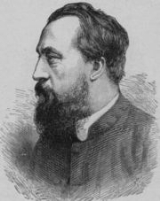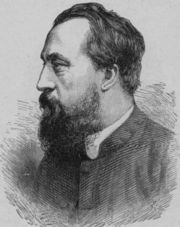
John George Wood
Encyclopedia

England
England is a country that is part of the United Kingdom. It shares land borders with Scotland to the north and Wales to the west; the Irish Sea is to the north west, the Celtic Sea to the south west, with the North Sea to the east and the English Channel to the south separating it from continental...
writer
Writer
A writer is a person who produces literature, such as novels, short stories, plays, screenplays, poetry, or other literary art. Skilled writers are able to use language to portray ideas and images....
on natural history
Natural history
Natural history is the scientific research of plants or animals, leaning more towards observational rather than experimental methods of study, and encompasses more research published in magazines than in academic journals. Grouped among the natural sciences, natural history is the systematic study...
.
Wood was born in London
London
London is the capital city of :England and the :United Kingdom, the largest metropolitan area in the United Kingdom, and the largest urban zone in the European Union by most measures. Located on the River Thames, London has been a major settlement for two millennia, its history going back to its...
, son of surgeon John Freeman Wood and Juliana Lisetta, and educated at home, at Ashbourne grammar school and Merton College, Oxford
Oxford
The city of Oxford is the county town of Oxfordshire, England. The city, made prominent by its medieval university, has a population of just under 165,000, with 153,900 living within the district boundary. It lies about 50 miles north-west of London. The rivers Cherwell and Thames run through...
(B.A., 1848, M.A., 1851); also at Christ Church
Christ Church, Oxford
Christ Church or house of Christ, and thus sometimes known as The House), is one of the largest constituent colleges of the University of Oxford in England...
, where he worked for some time in the anatomical museum under Sir Henry Acland. In 1852 he became curate
Curate
A curate is a person who is invested with the care or cure of souls of a parish. In this sense "curate" correctly means a parish priest but in English-speaking countries a curate is an assistant to the parish priest...
of the parish
Parish
A parish is a territorial unit historically under the pastoral care and clerical jurisdiction of one parish priest, who might be assisted in his pastoral duties by a curate or curates - also priests but not the parish priest - from a more or less central parish church with its associated organization...
of St Thomas the Martyr, Oxford, and in 1854 was ordained priest; he also took up the post of chaplain to the Boatmen's Floating Chapel at Oxford. Among other benefice
Benefice
A benefice is a reward received in exchange for services rendered and as a retainer for future services. The term is now almost obsolete.-Church of England:...
s which he held was for a time chaplain
Chaplain
Traditionally, a chaplain is a minister in a specialized setting such as a priest, pastor, rabbi, or imam or lay representative of a religion attached to a secular institution such as a hospital, prison, military unit, police department, university, or private chapel...
to St. Bartholomew's Hospital. In 1878 Wood settled in Upper Norwood
Upper Norwood
Upper Norwood is an elevated area in south London, England within the postcode SE19. It is a residential district largely in the London Borough of Croydon although some parts extend into the London Borough of Lambeth, London Borough of Southwark and the London Borough of Bromley. Upper Norwood...
, where he lived until his death.
In 1854, he gave up his curacy to devote himself for a time to literary work. In 1858 he accepted a readership at Christ Church, Newgate Street, and he was assistant-chaplain to St Bartholomew's Hospital, London, from 1856 until 1862. Between 1868 and 1876 he held the office of precentor
Precentor
A precentor is a person who helps facilitate worship. The details vary depending on the religion, denomination, and era in question. The Latin derivation is "præcentor", from cantor, meaning "the one who sings before" ....
to the Canterbury Diocesan Choral Union. After 1876 he devoted himself to the production of books and to delivering in all parts of the country lectures on zoology, which he illustrated by drawing on a black-board or on large sheets of white paper with coloured crayons. These "sketch lectures," as he called them, were very popular, and made his name widely known both in Great Britain
Great Britain
Great Britain or Britain is an island situated to the northwest of Continental Europe. It is the ninth largest island in the world, and the largest European island, as well as the largest of the British Isles...
and in the United States
United States
The United States of America is a federal constitutional republic comprising fifty states and a federal district...
.
Wood gave occasional lectures from 1856. In 1879, however, he began lecturing as a second profession, and continued to lecture steadily until 1888 both in the United Kingdom
United Kingdom
The United Kingdom of Great Britain and Northern IrelandIn the United Kingdom and Dependencies, other languages have been officially recognised as legitimate autochthonous languages under the European Charter for Regional or Minority Languages...
and abroad. He delivered the Lowell Lectures in Boston, Massachusetts, in 1883-4.
He was a very prolific writer on natural history
Natural history
Natural history is the scientific research of plants or animals, leaning more towards observational rather than experimental methods of study, and encompasses more research published in magazines than in academic journals. Grouped among the natural sciences, natural history is the systematic study...
, though rather as a populariser than as a scientific investigator, and was in this way very successful. For example, his book Common objects of the country sold 100,000 copies in a week. Among his numerous works may be mentioned Illustrated Natural History (1853), Animal Traits and Characteristics (1860), Common Objects of the Sea Shore (1857),The Uncivilized Races, or Natural History of Man (1870), Out of Doors (1874) (a book that was quoted by Sir Arthur Conan Doyle in his Sherlock Holmes
Sherlock Holmes
Sherlock Holmes is a fictional detective created by Scottish author and physician Sir Arthur Conan Doyle. The fantastic London-based "consulting detective", Holmes is famous for his astute logical reasoning, his ability to take almost any disguise, and his use of forensic science skills to solve...
story "The Adventure of the Lion's Mane
The Adventure of the Lion's Mane
"The Adventure of the Lion's Mane", one of the 56 Sherlock Holmes short stories written by British author Sir Arthur Conan Doyle, is one of 12 stories in the cycle collected as The Case Book of Sherlock Holmes. It is notable for being narrated by Holmes himself, instead of by Dr...
"), Field Naturalist's Handbook (with T. Wood) (1879-80), books on gymnastics, sport, etc., and an edition of White's Selborne
Selborne
Selborne is a village in the East Hampshire district of Hampshire, England. It is south of Alton. It will be just within the extreme northern boundary of the proposed South Downs National Park, which is due to take effect in mid-2010....
. He was also editor of The Boys Own Magazine.
He died at Coventry
Coventry
Coventry is a city and metropolitan borough in the county of West Midlands in England. Coventry is the 9th largest city in England and the 11th largest in the United Kingdom. It is also the second largest city in the English Midlands, after Birmingham, with a population of 300,848, although...
on March 3, 1889.

